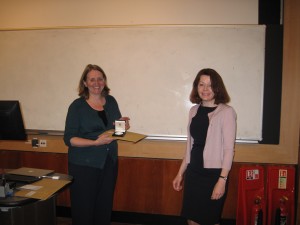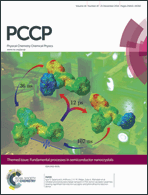Read Professor E. Arunan’s thought-provoking arguments for a world without borders:
Borders in science and nations are artificial. Should we have borders within India?
E. Arunan
Current Science, 2017, 112 (3), 435-436.
Read Professor E. Arunan’s thought-provoking arguments for a world without borders:
Borders in science and nations are artificial. Should we have borders within India?
E. Arunan
Current Science, 2017, 112 (3), 435-436.
Launching this year, the Lectureship was created to recognise and support an emerging scientist working in physical chemistry, chemical physics or biophysical chemistry who is making an outstanding contribution to their field and is at an early stage of their career.
Nominations were open to all and were made by leading researchers from around the world. The nominee list was shortlisted by the Editorial Board prior to the Fall PCCP Editorial Board meeting, at which, Dr David Glowacki, University of Bristol, was selected as the inaugural recipient.
As part of the Lectureship Dr Glowacki will be awarded a travel bursary of £1000 to attend and present at a leading international event in 2017, where he will be presented his Lectureship award. Dr Glowacki has also been invited to contribute a Perspective article to PCCP.
Many congratulations to Dr Glowacki on behalf of the PCCP Ownership Societies and Editorial Board.
Nominations for the 2017 PCCP Emerging Investigator Lectureship will open next summer, keep up to date with latest journal news on the blog, Twitter, newsletter and e-TOC alerts.
In celebration of Peer Review Week, with the theme of Recognition for Review – we would like to highlight the top 10 reviewers for PCCP in 2016. They have been selected by the editor for their significant contribution to the journal.
Top 10 reviewers for PCCP
Dr Jose Plata, Duke University
Dr Martijn Zwijnenburg, University College London
Professor Katsuhiko Ariga, National Institute for Materials Science
Dr Wenwei Zheng , National Institute of Diabetes and Digestive and Kidney Diseases, National Institutes of Health
Professor Martin Korth, Ulm University
Dr Antonio Cammarata, Czech Technical University in Prague
Dr Leonardo Bernasconi, STFC Rutherford Appleton Laboratory
Professor Jianing Li, University of Vermont
Professor Martin Suhm, Georg August Universitaet Goettingen
Professor Dennis Salahub, University of Calgary
We would like to say a massive thank you to these reviewers as well as the PCCP board and all of the community for their continued support of the journal, as authors, reviewers and readers.
We are delighted to announce we are welcoming nominations for the inaugural PCCP Emerging Investigator Lectureship. Launching this year, the lectureship will be awarded annually from 2016 onwards to recognise and support an emerging scientist working in physical chemistry, chemical physics or biophysical chemistry.
 Lectureship details
Lectureship details
The PCCP Emerging Investigator Lectureship recognises the significant contribution of early career researchers in physical chemistry, chemical physics and biophysical chemistry and is a platform for an early career physical chemist to showcase their research to the wider scientific community. The recipient will receive up to £1000 contribution towards travel and accommodation costs to attend and present at a leading international meeting hosted by the PCCP Ownership Board. The recipient will also be invited to contribute a Perspective article to PCCP.
Eligibility
To be eligible for the lectureship, candidates must:
• Have completed their PhD and be pursuing an independent research career within physical chemistry, chemical physics or biophysical chemistry.
• Be at an early stage of their independent career. Typically this will be within 10 years of completing their PhD, but appropriate consideration will be given to those who have taken a career break or followed a different study path.
Selection criteria, nomination and judging process
• Nominations must be made via email using the PCCP Emerging Investigator Lectureship nomination form and a letter of recommendation.
• Individuals cannot nominate themselves for consideration.
• The recipient will be selected by the PCCP Editorial Board at the 2016 PCCP Editorial Board meeting. Details of the PCCP Editorial Board can be found online at www.rsc.org/pccp.
• The winner will be selected based on their nomination, with due consideration given to the letter of recommendation, candidate biography, research achievements, previous PCCP publications and overall publication history.
Submit a nomination
To be considered for the lectureship the following must be sent to the Editorial Office
• A letter of recommendation
• A complete nomination form
Submission deadline 2 September 2016
The Gordon F. Kirkbright bursary award is a prestigious annual award that enables a promising student/non-tenured young scientist of any nation to attend a recognised scientific meeting or visit a place of learning.
The fund for this bursary was established in 1985 as a memorial to Professor Gordon Kirkbright in recognition of his contributions to analytical spectroscopy and to science in general. Although the fund is administered by the Association of British Spectroscopists (ABS) Trust, the award is not restricted to spectroscopists.
Applications are invited for the 2017 Gordon Kirkbright Bursary.
For further information contact John Chalmers at, email: vibspecconsult@aol.com
The closing date for entries is 31 December 2016.

London – May 16: We are delighted to announce a new partnership between Overleaf and the Royal Society of Chemistry. Through this partnership, authors submitting to Physical Chemistry Chemical Physics (PCCP) will have access to the award-winning Overleaf collaborative cloud-based writing and reviewing tool with 1-click submission into the PCCP ScholarOne submission system.
A PCCP journal template is available within the Overleaf platform to help authors write, collaborate and publish their work in the correct journal format. Once authors are finished writing, they can quickly and easily submit to PCCP using the 1-click submission link within Overleaf. All files and necessary information will be seamlessly transferred to the PCCP submission system – greatly simplifying the author’s submission experience.
Caroline Burley, Journals Operations Manager, Publishing Services & Production at the Royal Society of Chemistry, says:
“Our authors want the submission process to be quick and simple, so we’re very pleased to be partnering with Overleaf to offer this benefit to PCCP’s authors. This development makes the process of submitting a paper to PCCP from the Overleaf platform as easy as the click of a button.”
John Hammersley, Founder & CEO of Overleaf says:
“I’m hugely excited for Overleaf to be able to support the Royal Society of Chemistry, the PCCP journal and their authors through this new partnership. Simplifying and streamlining an author’s writing and submission experience is a major goal for Overleaf and this partnership addresses that perfectly.”
Links to the template and Overleaf platform are available at the PCCP journal website.
I
About The Royal Society of Chemistry
We are the oldest chemical society in the world and in 2016 we’re celebrating 175 years of progress and people in the chemical sciences. Throughout the year, we’re sharing the stories of how our members past and present have helped to change the world with chemistry.
With over 50,000 members and a knowledge business that spans the globe, we are the UK’s professional body for chemical scientists; a not-for-profit organisation with 175 years of history and an international vision of the future.
We promote, support and celebrate chemistry. We work to shape the future of the chemical sciences – for the benefit of science and humanity.
I
About Overleaf
Founded in 2012 and with over 400,000 registered users, Overleaf is an academic authorship tool that allows seamless collaboration and effortless manuscript submission, all underpinned by cloud-technology. By providing an intuitive online collaborative writing and publishing platform, Overleaf is making the process of writing, editing and publishing scientific documents quicker and easier. Researchers and academics can now write, collaborate, and publish with a single click, directly from the Overleaf web-app. Publishers and Institutions are partnering with Overleaf to provide customized writing templates, simple reference tool linking, and one-click publishing submission links.
Supported by Digital Science, Overleaf aims to make science and research faster, more open and more transparent by bringing the whole scientific writing process into one place in the cloud – from idea, to writing, to review, to publication.
Check out the following HOT articles, these have all been made free to access for a limited time:
Structure and energetics of the anisole–Arn (n = 1, 2, 3) complexes: high-resolution resonant two-photon and threshold ionization experiments, and quantum chemical calculations
Federico Mazzoni, Maurizio Becucci, Jan Řezáč, Dana Nachtigallová, François Michels, Pavel Hobza and Klaus Müller-Dethlefs
Phys. Chem. Chem. Phys., 2015, 17, 12530-12537
DOI: 10.1039/C5CP01166C
Oxygen diffusion in single crystal barium titanate
Markus Kessel, Roger A. De Souza and Manfred Martin
Phys. Chem. Chem. Phys., 2015, 17, 12587-12597
DOI: 10.1039/C5CP01187F
Vibrational control of electron transfer reactions: A feasibility study for the fast coherent transfer regime
P. Antoniou, Z. Ma, P. Zhang, D. N. Beratan and S. S. Skourtis
Phys. Chem. Chem. Phys., 2015, Advance Article
DOI: 10.1039/C5CP00610D
Three-dimensional sp2-hybridized carbons consisting of orthogonal nanoribbons of graphene and net C
Meng Hu, Xu Dong, Bingchao Yang, Bo Xu, Dongli Yu and Julong He
Phys. Chem. Chem. Phys., 2015, 17, 13028-13033
DOI: 10.1039/C5CP01621E
Two-dimensional electronic-vibrational spectra: modeling correlated electronic and nuclear motion
F. Terenziani and A. Painelli
Phys. Chem. Chem. Phys., 2015, 17, 13074-13081
DOI: 10.1039/C5CP01485A
Self-assembly and coverage dependent thermally induced conformational changes of Ni(II)-meso-tetrakis (4-tert-butylphenyl) benzoporphyrin on Cu(111)
Liang Zhang, Michael Lepper, Michael Stark, Dominik Lungerich, Norbert Jux, Wolfgang Hieringer, Hans-Peter Steinrück and Hubertus Marbach
Phys. Chem. Chem. Phys., 2015, 17, 13066-13073
DOI: 10.1039/C5CP01490E
Gas-phase chemistry of technetium carbonyl complexes
Yang Wang, Zhi Qin, Fang-Li Fan, Hiromitsu Haba, Yukiko Komori, Shi-Wei Cao, Xiao-Lei Wu and Cun-Min Tan
Phys. Chem. Chem. Phys., 2015, 17, 13228-13234
DOI: 10.1039/C5CP00979K
Generating hydrated electrons through photoredox catalysis with 9-anthrolate
Christoph Kerzig and Martin Goez
Phys. Chem. Chem. Phys., 2015, 17, 13829-13836
DOI: 10.1039/C5CP01711D
Hybrid nanostructures for SERS: materials development and chemical detection
Sara Fateixa, Helena I. S. Nogueira and Tito Trindade
Phys. Chem. Chem. Phys., 2015, Advance Article
DOI: 10.1039/C5CP01032B
Is seven the minimum number of water molecules per ion pair for assured biological activity in ionic liquid–water mixtures?
Hiroyuki Ohno, Kyoko Fujita and Yuki Kohno
Phys. Chem. Chem. Phys., 2015, Advance Article
DOI: 10.1039/C5CP00768B
PCCP is pleased to announce that the winners of the 2014 awards for achievements in physical chemistry, received their prizes on 5th May 2015 at the University of Birmingham. Professor Helen Fielding of UCL presented these awards on behalf of the Faraday Division.The winners of the 2015 awards have now also been announced.
The 2014 winners:
Harrison-Meldola Memorial Prizes 2014 Winner – David Glowacki, University of Bristol/Stanford University
Bourke Award 2014 Winner – Professor Ann McDermott, Columbia University
Chemical Dynamics Award 2014 Winner – Professor Andrew Orr-Ewing, University of Bristol
Liversidge Award 2014 Winner – Professor Michael Ashfold, University of Bristol
 |
Left: Andrew Orr-Ewing, Helen Fielding, David Golwacki and Michael Ashfold
Right: Ann McDermott and Helen Fielding |
 |
When you cook a lobster you will see a striking colour transformation from dark blue to orange-pink and until now, the cause for this has been subject to debate. Although the presence of astaxanthin, a carotenoid, is known to be responsible for the change, a recent PCCP article has shed light on exactly how.
In an international collaboration, Dr. John Halliwell at the University of Manchester and his group, have found that astaxanthin is present as a negatively charged enolate ion in the uncooked blue lobster. On heating, the enolate bonds break down and release orange-pink astaxanthin causing the colour change. This discovery has been made as a result of the combined interdisciplinary expertise in physical organic, biological and theoretical chemistry as well as spectroscopy.
Interested to know more?
Read the full article in Chemistry World by William Bergius.
Or, take a look at the original Open Access research article:
On the origin and variation of colours in lobster carapace, Shamima Begum, Michele Cianci, Bo Durbeej, Olle Falklöf, Alfons Hädener, John R. Helliwell, Madeleine Helliwell, Andrew C. Regan and C. Ian F. Watt, Phys. Chem. Chem. Phys., 2015, DOI: 10.1039/C4CP06124A
PCCP is delighted to present a themed collection which includes a number of great articles on Fundamental Processes in Semiconductor Nanocrystals. The issue was guest edited by Efrat Lifshitz (Technion, Israel) and Laurens Siebbeles (TU Delft, The Netherlands) and brings together a collection of contributed papers that cover current interest in a wide variety of topics associated with semiconductor crystals. You can read the Guest Editor’s full introduction to the issue in their Editorial.
There are a number of great contributions in this issue, including:
Influence of nanoparticle shape on charge transport and recombination in polymer/nanocrystal solar cells
Zhe Li, Weiyuan Wang, Neil C. Greenham and Christopher R. McNeill
Phys. Chem. Chem. Phys., 2014,16, 25684-25693
Multiple exciton generation in cluster-free alloy CdxHg1−xTe colloidal quantum dots synthesized in water
Stephen V. Kershaw, Sergii Kalytchuk, Olga Zhovtiuk, Qing Shen, Takuya Oshima, Witoon Yindeesuk, Taro Toyoda and Andrey L. Rogach
Phys. Chem. Chem. Phys., 2014,16, 25710-25722
Take a look at the themed collection online now to see all of the great contributions!